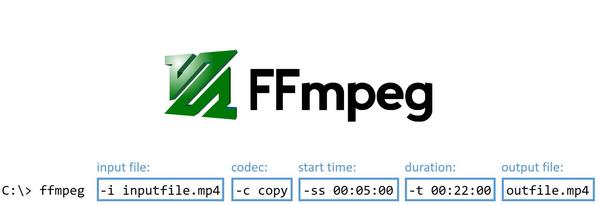
(SSRC and PayloadType should be bound to rtp port in service-side config, and no need to require client to pass in)īut since mediasoup requires this, the publish url “rtp://…” has to put a prefix string which contains the SSRC and PayloadType paramters, and due to this, i have to use the ffmpeg -f tee output format and -f tee further requires a -map 0:v:0 option. 264 stream to mpegts format with ffmpeg, you can use the command: ffmpeg -i INPUT.mp4 -codec copy -bsf:v h264mp4toannexb OUTPUT.ts Please note that this filter. The key point here is: mediasoup server requires SSRC and PayloadType paramters from publisher client, which i really don’t get the reason behind this: because in Janus streaming demo, I only need the videoRtpPort to do RTP streaming push.

bsf:v h264_mp4toannexb -an -deadline realtime \
Ffmpeg copy code#
slang code: Set the ISO 639 language code (. newsubtitle: Add a new subtitle stream to the current output stream. Adding the option copy after each results in FFMPEG using and copying the codec from the input file.

c:v also seen as -vcodec sets the video codec, while -c:a or -acodec sets the audio codec. Previouly i tried the command from RTP (II): Streaming with FFmpeg - Kurento below: ffmpeg -re \īut it does not work, mediasoup server log indicates that it seemed web page receiver send a RTCP PLI for keyframe, but blocked since ffmpeg command line did’t response correctlyīut this is NOT the case, i use the new command to do RTP push stream successfully(code in nodejs): const callRTPStreamPushCmd = `ffmpeg -re \ Force subtitle codec (copy to copy stream). Copying a codec from one video to another is easy and convenient as seen below: ffmpeg -i input.avi -c:v copy -c:a copy output.mp4. Scenario: ffmpeg publisher → mediasoup SFU server → chrome web page receiver ffmpeg -c copy vs -copyts vs -copytb etc & similar options Whats the overlap, differences, significances, pros cons, how, why & when TO or.


 0 kommentar(er)
0 kommentar(er)
